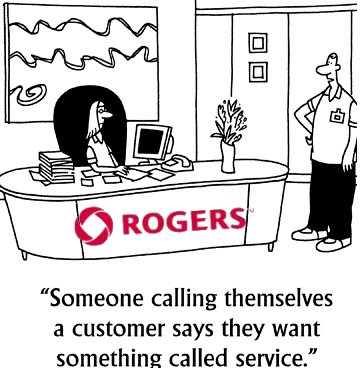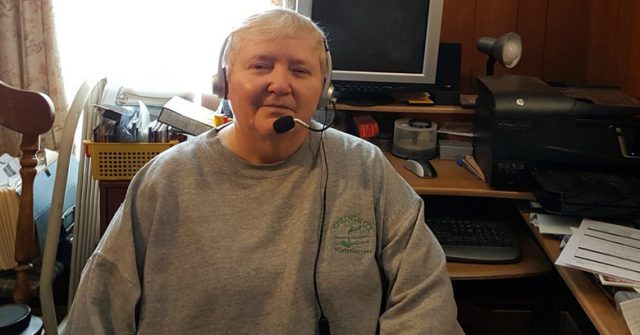 Rogers Communications’ call center workers treated customers as adversaries and allegedly placed unauthorized charges on customer bills, didn’t disclose service fees, and avoided downgrading or disconnecting service while managers encouraged these practices and lectured workers it was not their job to worry about what customers thought.
Rogers Communications’ call center workers treated customers as adversaries and allegedly placed unauthorized charges on customer bills, didn’t disclose service fees, and avoided downgrading or disconnecting service while managers encouraged these practices and lectured workers it was not their job to worry about what customers thought.
Days after CBC News’ Go Public unit revealed stories of customer abuse shared by Rogers’ call center workers, more than two dozen additional current and former workers have now come forward confirming the first report and declaring the company’s call center work environment was uniformly “toxic,” “intense,” “high pressure,” and abusive to employees and customers alike.
“It was a calculated game of misery.”
Rogers management cares about only one thing, employees claim — making money any way a representative can, even if it means pushing products and services on unsuspecting customers.
A four-year employee at Rogers call center in Brampton, Ont., who left in 2015, still vividly remembers he was trained to trick customers at every turn.
- He and his colleagues were trained not mention cancellation fees charged by other providers when a customer switched to Rogers.
“Because these fees were not charged by Rogers itself, we were told to gloss over them as quickly, vaguely and incoherently as possible,” he writes. “Often while the customer was speaking at the same time.”
- Agents were shown how to quietly remove some services from a customer’s account while adding others that counted towards a monthly sales goal, hoping the customer wouldn’t notice.
This trick, he told CBC News, involved secretly reducing certain services — such as the number of television channels a customer received — so an agent could add new services, such as a home phone line they didn’t necessarily need, but that earned points towards monthly sales target.
“It was a calculated game of misery,” he says. “How much could you lower their existing services so they wouldn’t immediately notice, while at the same time adding as much in new services as you could?”
“It’s not your job to care.”
 In its original report, CBC News quoted a Rogers spokesperson who denied knowledge of these practices and declared there was no tolerance for employees who mistreated customers. But the latest group of employees to come forward consider the abuses systematic and occurred with the full knowledge of company managers and supervisors.
In its original report, CBC News quoted a Rogers spokesperson who denied knowledge of these practices and declared there was no tolerance for employees who mistreated customers. But the latest group of employees to come forward consider the abuses systematic and occurred with the full knowledge of company managers and supervisors.
The former worker in Brampton noted that when he brought concerns to his manager questioning the ethics of some of the business practices he was reminded he worked in sales and was told, “It’s not your job to care.”
Intentionally Frustrating Customers Until They Give Up and Hang Up
If a customer called in to complain about something on their bill, downgrade, or cancel service — all things that could affect sales targets, it was ‘all hands on deck’ among call center workers and their colleagues. In addition to hanging up on customers trying to cancel service, Rogers customer service representatives tricked customers trying to escalate a problem to a manager. Instead of transferring calls to an actual manager, employees were taught to transfer the call to a fellow agent who was prepared to repeat claims there was nothing Rogers could do to resolve the issue.
“The goal,” he says, “was for the customer to be so frustrated, speaking to someone who couldn’t do anything more than you, that they ended the call.”
“The things that go on behind closed doors would leave you speechless.”

Debbie Sears (Image courtesy of: Debbie Sears/CBC)
Making a call to Rogers’ customer service can be risky business for customers, because it gives call center workers access to your account, where they can add services without your knowledge to help make their monthly sales targets.
Nicole McDonnell worked at a third-party call center in London, Ont., contracted with Rogers to provide customer service. She quit three months ago disturbed about what she saw. She told CBC News she witnessed agents making unauthorized changes to customer accounts, such as adding lucrative cellphone activation charges without the knowledge of the customer.
“The things that go on behind closed doors would leave you speechless,” she writes.
Debbie Sears echoed McDonnell. Taking calls from her home office in Kingston, N.S. through a subcontractor, Sears was trained to do one thing above all else: sell.
“We were constantly being threatened that we would be fired if we did not upsell — add a home line or a cellphone to the account,” she says. “It was a pressure cooker. They expected you to sell on every call. And you were told time and again, ‘Never take no for an answer. Push, push, push!'”
Sears said she was trained to push phone protection plans for cellphones for $12 a month, but was told not to mention a replacement fee of up to $200 applied if a customer ever made a claim. Other times, she claims, managers would approve cellphone sales even when a credit check suggested a customer was opening a fraudulent account or had very poor credit.
“I have a hard time selling something that’s useless to them [customers],” says Sears. “I told them right from the start, and they said, ‘Oh well, you’ll get used to it.'”
Apparently not. Sears said she began having panic attacks before her shift would begin and her blood pressure “went through the roof.”
Like other Rogers employees that don’t make their sales targets, she was eventually terminated.
“My doctor was very worried I’d have a stroke,” she says. “When I got laid off [for not selling], they did me a favor.”
Former Rogers Manager: ‘My job was to manage out the low performers — witch-hunt those people. Grown men would be crying.’
One former Rogers manager reached out to Go Public to share how he was trained to put pressure on workers in the Ottawa call center.
The pressure for sales reached a new level of intensity in 2015 when Rogers issued a memo directing senior leadership to light a fire under call center workers to get them to sell more services. At least two-thirds of all call center workers were placed on a “performance improvement plan” that most employees understood was the kiss of death to their employment in the near future. The message was perfectly clear – sell more or risk being terminated.
CBC:
“Every day we’d have a meeting about sales targets,” he says. “A big part of my job was to manage out the low performers. Witch-hunting those people.”
On the other hand, he says, top sellers were protected — even if they behaved unethically.
“Senior leadership would often issue directives to the team managers to protect their top-level performers by turning a blind eye,” he says. “Protect the tops.”
Once an employee found themselves assigned to the “performance improvement plan,” managers knew most would have to go, and they had no patience for anything except a radical turnaround. If the employee still struggled making sales, their future was bleak. The ex-manager told CBC News he would squeeze every minute out of their last day at the company, tapping them on the shoulder five minutes before the end of their shift to put them in a private room, and then fire them.
“Grown men would be crying, desperate because they couldn’t sell enough,” he says. “But sales was everything.”
When it got too much for even him and he began questioning Rogers’ way of doing business, he was fired too.
‘Shocking and appalling’
Vancouver labor lawyer Lia Moody says she’s been following the Rogers employees’ allegations, and finds them “shocking and appalling.”
Moody told the CBC Rogers’ apparent business practices ‘contravenes what Canadians consider their ethics and values.”
“I think it’s important that people are speaking out. Public shaming,” she says, “is the only way a company will make changes.”


 Subscribe
Subscribe